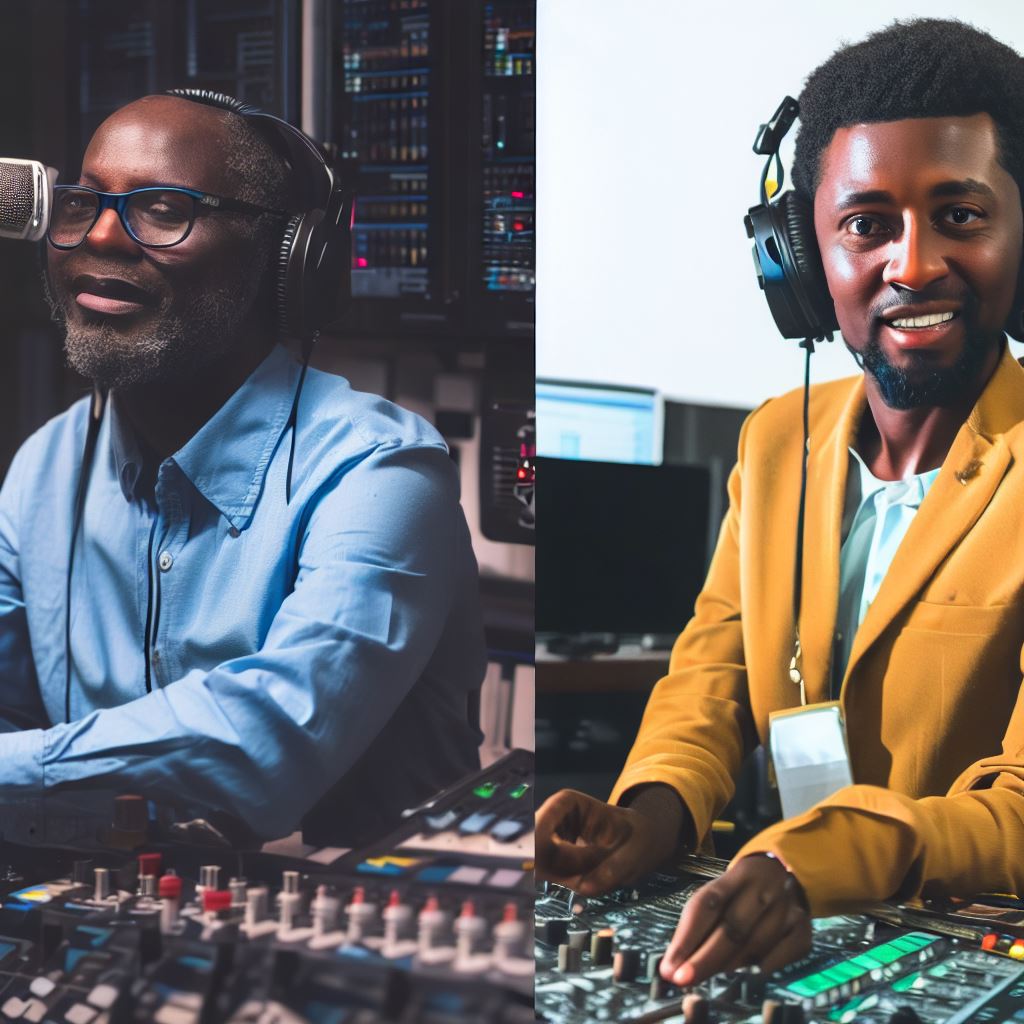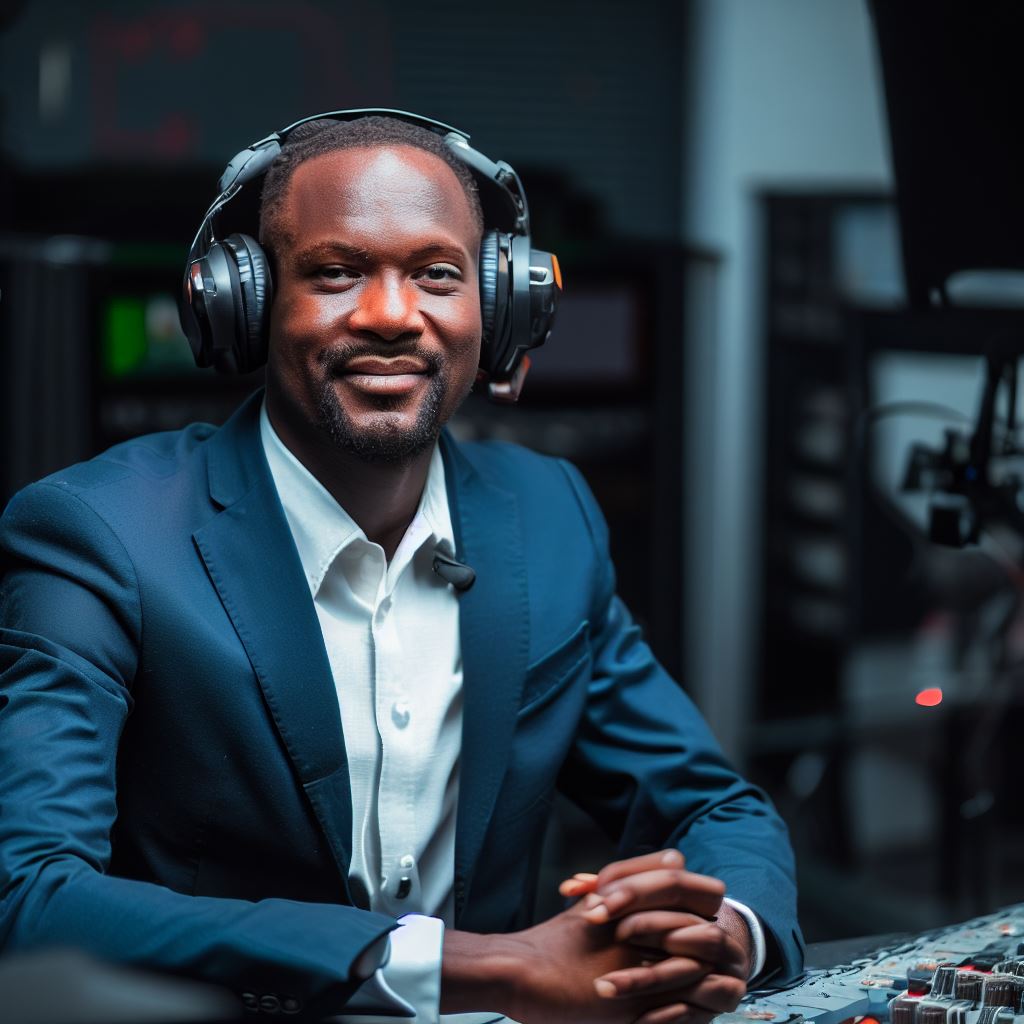Introduction
Let’s explore advancing your career in radio sports production.
Advancing a career in radio sports production offers exciting opportunities for growth and success.
In the dynamic realm of sports broadcasting, the heartbeat of exhilarating moments and electrifying commentary lies within radio sports production.
It’s a field that fuses the art of storytelling with the passion for sports, creating an immersive experience for millions of avid listeners.
Whether you’re a seasoned professional or an aspiring enthusiast, the path to success in radio sports production is paved with opportunities for growth, innovation, and influence.
This guide is tailored to equip you with the knowledge, skills, and strategic insights needed to elevate your career in this exhilarating industry.
From mastering the intricacies of live broadcasts to building invaluable connections with industry leaders, every facet of your journey will be addressed.
The ever-growing popularity of sports broadcasting creates a multitude of chances for career development.
Together, we’ll unravel the secrets to crafting compelling narratives, delivering seamless productions, and staying ahead in a constantly evolving field.
Join us on this odyssey, where we’ll explore the multifaceted world of radio sports production, uncovering the techniques and strategies that distinguish the exceptional from the ordinary.
Embark on a transformative journey towards not just a job, but a flourishing vocation that allows you to leave an indelible mark on the sports broadcasting landscape.
Welcome to the adventure of advancing your career in radio sports production.
Understanding the Field of Radio Sports Production
The role of a radio sports producer
A radio sports producer is responsible for overseeing the production of sports-related content for radio broadcasts.
They coordinate with talent, plan show segments, conduct research, and ensure smooth execution of the broadcast.
The skills and qualifications required for this position.
1. Technical knowledge of audio equipment and software
A radio sports producer should have a strong understanding of audio editing and recording software, as well as the ability to troubleshoot technical issues.
2. Familiarity with sports and understanding game dynamics
They must possess a deep knowledge and passion for sports, including rules, players, teams, and game strategies.
3. Strong communication and teamwork skills
Radio sports producers must effectively communicate with talent, editors, and other team members involved in the broadcast process.
Working as a radio sports producer can be both stimulating and demanding.
It requires a combination of technical expertise, sports knowledge, and strong interpersonal skills.
Producers need to be able to adapt to fast-paced environments and think on their feet.
Having a comprehensive understanding of the role is essential to advance in the field.
The role of a radio sports producer goes beyond simply overseeing a broadcast.
They conduct thorough research to provide accurate and up-to-date information during the broadcast.
Technical knowledge is essential, as they are responsible for setting up, operating, and troubleshooting audio equipment.
They must ensure that microphones, soundboards, and other devices are functioning properly for a seamless broadcast.
Strong communication and teamwork skills are vital in this role.
Producers collaborate with talent, directors, editors, and other team members to execute the broadcast smoothly.
They provide cues and directions to on-air talent, keeping the show on schedule and ensuring a cohesive flow.
Being a radio sports producer requires the ability to adapt to fast-paced environments.
During live broadcasts, things can change rapidly, and producers need to make quick decisions.
They must be able to handle pressure and make split-second judgments.
With the right skills, qualifications, and experience, one can advance in the field of radio sports production.
Continuous learning and staying up-to-date with new technologies and trends is also crucial for success.
Becoming a radio sports producer can be a rewarding career choice for individuals passionate about sports and broadcasting.
By understanding the role and developing the necessary skills, one can excel in this dynamic field.
Building a Strong Foundation
When it comes to advancing your career in radio sports production, building a strong foundation is vital.
This is the stage where you lay the groundwork for future success by acquiring the necessary education, training, and knowledge to excel in the field.
In this section, we will explore two key aspects of building a strong foundation: pursuing relevant education and training programs and expanding your knowledge about different sports.
Pursue relevant education and training programs
To start your journey, it is essential to pursue relevant education and training programs.
Broadcasting or media-related courses can provide you with a solid understanding of the industry, including the technical aspects of radio production and the skills required to excel in sports broadcasting.
These courses will give you a strong foundation to build upon as you progress in your career.
Additionally, seeking internships or part-time jobs at radio stations can provide invaluable practical experience and networking opportunities.
By working alongside industry professionals, you can learn the ins and outs of radio sports production, gain hands-on experience, and make important connections that may lead to future job opportunities.
These internships and part-time jobs allow you to apply the knowledge you have gained in the classroom to real-world scenarios, further strengthening your skills and understanding of the industry.
Learn about different sports and expand your knowledge
In addition to acquiring the necessary education and training, it is crucial to expand your knowledge about different sports.
As a radio sports producer, it’s essential to be well-versed in a variety of sports, as you may be required to cover events ranging from football and basketball to golf and tennis.
One way to enhance your knowledge is by following various sports events.
Watch games, listen to sports radio shows, and engage with sports media to stay updated on current trends, players, and teams.
By immersing yourself in the world of sports, you can gain valuable insights and learn how different sports are covered by radio broadcasters.
Furthermore, it is important to analyze different radio sports production techniques.
Pay attention to how different broadcasters approach their commentary, how they capture the atmosphere of the game, and how they engage their audience.
By studying these techniques, you can learn how to effectively convey the excitement and drama of sports through your own radio productions.
Building a strong foundation is key to advancing your career in radio sports production.
By pursuing relevant education and training programs, you can gain the necessary skills and knowledge to excel in the field.
Additionally, expanding your knowledge about different sports allows you to become a well-rounded sports producer who can cover a wide range of events.
With a strong foundation in place, you’ll be better positioned to take your career in radio sports production to new heights.
Developing Technical Skills
Having strong technical skills is crucial in the field of radio sports production.
Whether you are editing audio clips or operating broadcasting equipment during a live broadcast, mastering these skills will set you apart from the competition.
Master audio editing software and equipment
To begin, it is essential to learn the basics of recording and editing audio.
This includes understanding different file formats such as WAV or MP3 and knowing how to achieve optimal sound quality.
By grasping these concepts, you can ensure that your audio recordings are clear and professional.
Next, it is crucial to practice using audio editing software like Adobe Audition or Pro Tools.
These programs are industry-standard and will allow you to manipulate and improve the quality of your recordings.
Familiarize yourself with the software’s user interface and learn key functions such as cutting, mixing, and adding effects.
To truly excel in radio sports production, it is essential to experiment with different effects and sound enhancements.
This can include adding reverberation to create a sense of space or using equalization to adjust the tonal balance.
By honing your skills in this area, you can add depth and richness to your audio, making it more engaging for listeners.
Understand radio broadcasting equipment
In addition to mastering audio editing software, understanding radio broadcasting equipment is essential.
This includes learning how to operate microphones, mixers, and soundboards.
Different microphones serve various purposes, so familiarize yourself with their differences and how to use them effectively.
Furthermore, being knowledgeable about broadcasting protocols and regulations is crucial.
This includes understanding what is deemed appropriate content for radio and adhering to FCC guidelines.
By staying within these parameters, you can ensure your broadcasts are compliant and suitable for your audience.
To summarize, developing technical skills is a vital aspect of advancing your career in radio sports production.
Mastering audio editing software and equipment, as well as understanding broadcasting protocols, will set you apart and enable you to deliver high-quality content to your audience.
So, embrace the learning process, practice regularly, and stay up to date with industry advancements to excel in this competitive field.
Read: Networking for Radio Sports Producers in Nigeria
Networking and Gaining Industry Experience
Join professional associations and organizations for sports broadcasting
- Networking with others in the industry can provide valuable contacts and job opportunities.
- Associations such as the National Sports Media Association and Women in Sports Media offer networking events and resources.
- Membership in these organizations demonstrates a commitment to the field and can enhance your resume.
Attend industry conferences, workshops, and seminars to connect with industry professionals
- Conferences, such as the National Sports Forum, provide opportunities to learn from industry leaders and make connections.
- Workshops and seminars offer specialized training and the chance to meet professionals in your specific area of interest.
- Taking part in these events can show dedication to continuous learning and industry involvement.
Seek mentorship opportunities from experienced radio sports producers or broadcasters
- Having a mentor can provide guidance, insight, and support as you navigate your career path.
- Reach out to professionals in the field and express your interest in connecting and learning from them.
- Mentors can offer advice on career development, skill-building, and networking strategies.
Volunteer or work on local sports radio shows to gain practical experience
- Offering your time and skills to local radio stations can provide hands-on experience in sports production.
- Working with professionals in a real-world setting can help you develop technical and creative skills.
- Volunteering can also lead to paid positions or connections that may open doors for future opportunities.
Gaining industry experience and networking are crucial steps in advancing your career in radio sports production.
By joining professional associations and attending industry events, you can connect with industry professionals, learn from experts, and enhance your resume.
Seeking mentorship opportunities allows you to benefit from the guidance and support of experienced producers or broadcasters.
Additionally, volunteering or working on local sports radio shows provides practical experience and the chance to develop your skills.
By actively engaging in these networking and experience-building activities, you increase your chances of success in the competitive field of radio sports production.
Read: Finding Work as a Radio Sports Producer in Nigeria
Creating a Strong Portfolio and Demo Reel
A strong portfolio and demo reel are essential in advancing your career in radio sports production.
It is a way to showcase your best work and highlight your abilities and technical skills.
Here are some tips on how to create an impressive portfolio and demo reel:
Compile your best work and create a professional portfolio
Include samples of your radio sports production projects
By gathering your best work, you have the opportunity to display the breadth and depth of your experience.
Publish Your Professional Profile, Business or Brand
Showcase your expertise, gain trust, and boost visibility instantly on Professions.ng.
Publish NowThis can include highlights from live game broadcasts, sports talk shows, interviews with athletes or coaches, and any other relevant projects you have worked on.
Highlight your technical skills and knowledge in the field
Additionally, emphasize your technical skills such as audio editing, sound mixing, and knowledge of broadcasting equipment.
Develop a compelling demo reel showcasing your abilities
Select and edit clips that demonstrate your expertise in radio sports production
Your demo reel is like a trailer for your work. It should be engaging and leave a lasting impression on potential employers or clients.
Choose a variety of clips that highlight your skills, including play-by-play commentary, on-air hosting, and behind-the-scenes production.
Make sure the reel is concise, ideally not exceeding 3-5 minutes, as attention spans are short in the industry.
Trim the clips to showcase the best moments and keep the viewer hooked.
Ensure the reel is concise and attention-grabbing
To make your demo reel even more compelling, consider adding graphics or text overlays that highlight specific achievements or responsibilities.
This can help potential employers understand your role in each project and the impact you made.
However, be mindful of the balance between necessary information and overwhelming the viewer with excessive visuals.
Once you have created your portfolio and demo reel, make them easily accessible.
Create an online portfolio website or use platforms like LinkedIn or Behance to showcase your work.
Provide clear links or embed the reel directly on your portfolio page.
This way, anyone interested can easily review your work and determine if you are the right fit for their radio sports production needs.
In general, creating a strong portfolio and demo reel is crucial for advancing your career in radio sports production.
By compiling your best work and showcasing your abilities concisely, you increase your chances of standing out in a competitive industry.
Invest time and effort into creating an impressive portfolio and demo reel, as they can be powerful tools in landing your dream opportunities.
Read: Internships in Radio Sports Production in Nigeria

Building a Personal Brand and Online Presence
In today’s digital age, building a strong personal brand and online presence is essential for advancing your career in radio sports production.
Creating a professional website or online portfolio is the first step in establishing your credibility and showcasing your work to potential employers or clients.
Create a professional website or online portfolio
Creating a professional website or online portfolio allows you to curate and display your best work, skills, and experience.
Include a variety of samples, such as audio clips, articles, videos, or photos, that highlight your talents and expertise in radio sports production.
This will serve as a virtual resume and portfolio, making it easier for employers or clients to evaluate your abilities.
Furthermore, be sure to include a well-written bio that highlights your background, education, and relevant experiences.
This will give visitors a snapshot of who you are and what you can offer in the world of radio sports production.
Don’t forget to also provide your contact information, such as your email address or phone number, so interested parties can easily reach out to you.
Utilize social media platforms to establish and promote your personal brand
In addition to a professional website or online portfolio, social media platforms are powerful tools for establishing and promoting your personal brand.
Utilize platforms like Twitter, Facebook, Instagram, and LinkedIn to connect with a wider audience and demonstrate your passion for radio sports production.
On these platforms, share relevant content, such as industry news, your own work, or insights on sports production.
Engage with others in the field by commenting on their posts, joining relevant groups or communities, and sharing your expertise with others.
This will not only help you establish yourself as a knowledgeable professional but also increase your visibility and network within the industry.
Connect and engage with professionals in the industry through networking platforms
Networking is vital in any career, and radio sports production is no exception.
Make use of networking platforms, such as LinkedIn or industry-specific forums, to connect and engage with professionals in your field.
Join groups or organizations related to sports production and actively participate in discussions or events.
Networking not only allows you to learn from more experienced professionals but also opens up opportunities for collaboration or job offers.
Building meaningful relationships with industry peers can lead to referrals, recommendations, and valuable connections that can greatly enhance your career prospects.
In review, building a personal brand and online presence is crucial for advancing your career in radio sports production.
Create a professional website or online portfolio to showcase your work, skills, and experience.
Utilize social media platforms to establish and promote your personal brand.
Connect and engage with professionals in the industry through networking platforms to expand your network and open doors to new opportunities.
By taking these steps, you’ll increase your visibility, credibility, and chances of success in the competitive world of radio sports production.
Read: Radio Sports Producers in Nigeria: Success Stories
See Related Content: Nigeria’s Radio Sports Production: Trends & Insights
Job Search Strategies
Research potential employers in the radio sports production industry
When looking for a job in radio sports production, it is crucial to conduct thorough research on potential employers.
This will help you understand the nature of the company, its values, and the skills they prioritize.
By researching potential employers, you can tailor your application materials and interview responses to align with their specific needs.
This will make you a more competitive candidate and increase your chances of landing a job.
Tailor your resume and cover letter to highlight relevant experience and skills
One of the most important aspects of job hunting is tailoring your resume and cover letter to emphasize your relevant experience and skills in radio sports production.
This will make your application stand out among others.
Include specific examples of how your previous experience relates to the position you’re applying for.
Highlight any sports production-related projects or internships you’ve worked on, displaying your passion and dedication to the industry.
Prepare for interviews by practicing common industry-related questions
Preparing for interviews is essential to perform well and make a lasting impression.
Research common industry-related questions and practice your responses beforehand.
Anticipate questions about your knowledge of sports production, your ability to meet tight deadlines, and your experience working in a team.
By practicing your answers, you can confidently showcase your skills and communicate your enthusiasm for the field.
Use online job platforms and networks to explore available opportunities
In today’s digital age, it is crucial to utilize online job platforms and networks to explore available job opportunities in radio sports production.
Websites such as LinkedIn, Indeed, and industry-specific job boards can provide a wealth of opportunities.
Regularly check these platforms, as new positions are often posted, and tailor your application to each specific job posting.
Additionally, networking within the industry can be invaluable when searching for jobs.
Attend industry events, join relevant social media groups, and connect with professionals in the field. Opportunities can arise through these connections.
Remember, finding a job in radio sports production takes persistence, patience, and proactivity.
Continuously refine your application materials, practice your interview skills, and stay updated on industry trends.
With determination and the right strategy, you can advance your career in this exciting field.
Staying Current and Continuing Education
Stay updated with the latest advancements in radio sports production technology
- Regularly follow industry publications, websites, and blogs to stay informed about new equipment and techniques.
- Join online communities or forums where professionals discuss and share information about radio sports production.
- Connect with colleagues and experienced professionals in the field to exchange ideas and stay current.
Attend workshops, webinars, and conferences to enhance your knowledge and skills
- Look for industry-specific events that cover topics like audio editing, live broadcasting, and sports commentary.
- Participate in hands-on workshops to learn new techniques and practice using the latest equipment.
- Take advantage of webinars that cover specific aspects of radio sports production, such as sound design or play-by-play commentary.
- Attend conferences that bring together professionals from the industry, providing networking opportunities and informative sessions.
Seek additional certifications or advanced courses to further boost your qualifications
- Consider pursuing certifications related to radio broadcasting, audio engineering, or sports journalism.
- These certifications demonstrate your commitment to professional development and can enhance your resume.
- Explore advanced courses offered by universities or specialized training institutions to deepen your knowledge and skills.
- These courses may cover advanced audio production techniques, sports analysis, or sports journalism.
- Continuing your education shows employers your dedication to staying current and acquiring new skills.
Continuously improving your knowledge and skills is essential in the fast-paced field of radio sports production.
By staying updated with the latest advancements in technology, attending workshops and conferences, and pursuing additional certifications or advanced courses, you can enhance your qualifications and boost your career prospects.
Take advantage of every opportunity to learn and grow in this dynamic industry.
Conclusion
Throughout this blog post, we have explored the various ways to advance your career in radio sports production.
We began by emphasizing the importance of gaining relevant experience through internships and volunteer opportunities.
Additionally, we discussed the significance of networking and building strong relationships within the industry.
We also touched upon the significance of continuously updating your skills and staying up-to-date with advancements in technology.
Finally, we highlighted the importance of having a strong and professional online presence to showcase your work and attract potential employers.
It is clear that advancing in this industry requires dedication, perseverance, and continuous learning.
We encourage you to seize every opportunity to gain experience, whether it be through internships or volunteering.
Networking with industry professionals is vital, so attend events, join professional organizations, and build relationships.
Be proactive in enhancing your skills by taking courses, attending workshops, and staying updated on the latest technology trends.
Lastly, create a strong online presence by showcasing your work and engaging with others through social media or blogging.
The world of radio sports production is filled with endless growth potential and opportunities for success.
By honing your skills, expanding your network, and staying ahead of industry advancements, you can position yourself for a fulfilling and prosperous career.
Remember to embrace challenges, seek mentorship, and always maintain a positive mindset.
With determination and hard work, you can navigate your way towards the top of this exciting and evolving field.
Now, take the necessary steps, believe in yourself, and let your passion for radio sports production lead you to greatness.




